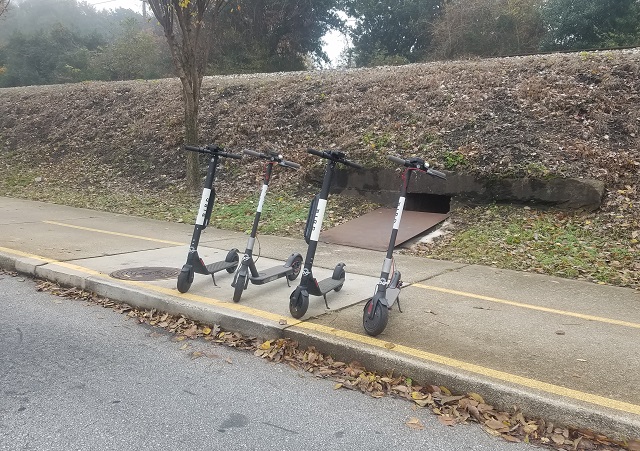The City Of Decatur Is Cracking Down On E-scooters

A quartet of Bird scooters improperly parked across a lane of the multi-use PATH near the Arlo.
Ann Abramowitz
This article was originally published on Dec. 14 at Decaturish.com and updated after the City Commission’s Dec. 17 meeting.
The city of Decatur sees all of the scooters strewn all over its sidewalks and it has seen enough.
At its Dec. 17 meeting, the City Commission adopted an item giving e-scooter companies — primarily Bird — an ultimatum: sign an operating agreement with us or we’re going to ban your scooters.
The scooters are simultaneously seen as a novel solution to last-mile connectivity and a public safety hazard.
Ann Abramowitz, a professor of psychology at Emory University and a member of the Decatur Active Living Board’s pedestrian advisory committee, recently told Decaturish that the scooters are a nuisance.
“They are everywhere, up and down the sidewalks. I see them parked more than I see anyone riding them,” she adds, noting their presence in her Ponce de Leon Heights neighborhood. “When I do see someone on one, they are almost always riding on the sidewalk and they are never wearing a helmet.”
City officials note that the scooter companies didn’t consult with city officials first before dropping their product off on the city’s streets.
“E-Scooters (also referred to as Stand up electric scooters) were deployed in the city earlier this fall without notice to, or in consultation with, the city of Decatur,” a memo from City Manager Peggy Merriss said. “Complaints about the number of scooters, scooters blocking sidewalks, streets and driveways and scooters being operated in an unsafe and erratic manner have steadily increased.”
The city believes in innovative solutions to mobility problems, Merriss wrote.
“However,” she added. “We recognize that the city has a role in protecting the safety and welfare of the public as well as assuring that sidewalks are reserved primarily for pedestrian activity.”
Attached to the agenda is a seven-page, 90-day operating agreement that the city expects the scooter companies to sign. Among the highlights of the agreement:
- Stand-up electric scooters are not to be ridden on sidewalks. Stand-up electric scooters are to be ridden on streets, and where available, in bike lanes and bike paths. Stand-up electric scooters are to stay to the right of street lanes and to offer the right of way to bicycles in bike lanes and on bike paths, and offer the right of way to pedestrians in crosswalks.
- Company shall provide easily visible contact information, including a twenty-four (24) hour toll-free phone number and/or e-mail address on each Stand-up electric scooter for members of the public to make relocation requests or to report other issues with devices. Company shall maintain a city of Decatur-specific website to address any questions or concerns.
- Company shall also provide city with contact information of a locally-based manager/operation staff with decision making power who can respond to city requests, emergencies, and other issues twenty-four (24) hours a day seven (7) days per week.
- Company shall not operate within the city limits of the city of Decatur at any given time more than fifty (50) Stand-up electric scooters (“Fleet”). City may request data from Company on a weekly basis to determine and demonstrate the utilization rate of devices in Company’s fleet within the city limits of the city of Decatur. Company may increase or decrease the Fleet size only with the city’s written approval based on the average ridership data reviewed by city at the end of ninety (90) day agreement. The city may deny a request to increase the Fleet size at its sole discretion.
- In addition to any taxes and fees imposed by city’s Code of Ordinances to operate a business, Company shall remit a regulatory fee of $3,000 and a ridership fee of One Dollar ($ 1.00) for each Stand-up electric scooter in operation each day to city to defray various costs incurred by city.
- Company shall install additional head-lights, tail-lights and audible bells to Stand-up electric scooters to improve safe ridership.
- Users shall not park Stand-up electric scooters in the street.
- Users shall only park Stand-up electric scooters upright on hard surfaces in the furniture zone of the sidewalk, beside a bicycle rack or in another area specifically designated for bicycle or Stand-up electric scooter parking.
- Users shall not park Stand-up electric scooters in such a manner as to block the pedestrian clear zone area of the sidewalk; any fire hydrant, call box, or other emergency facility; pedestrian call button; bus bench; or utility pole or box.
- Users shall not park Stand-up electric scooters in such a manner as to impede or interfere with the reasonable use of any commercial window display or access to or from any building.
- Users shall not park Stand-up electric scooters in such a manner as to impede or interfere with the reasonable use of any bicycle rack or news rack.
- Users shall park Stand-up electric scooters on blocks without sidewalks only if the travel lane(s) and 6-foot pedestrian clear zone are not impeded.
- Company shall maintain 24-hour customer service for customers to report safety concerns, complaints, or to ask questions. Company will maintain a multilingual website, call center, and/or mobile app customer interface that is available twenty-four (24) hours a day, seven (7) days a week. The aforementioned shall be compliant with the Americans with Disabilities Act.
- Company will implement a marketing and targeted community outreach plan at its own cost or pay an in-lieu fee determined by the city for the city to provide these services and promote the use of Stand-up electric scooter sharing citywide, particularly among low-income communities. Company will keep city informed of the targeted community outreach plan updates.
- Company shall work with local businesses or other organizations to promote the use of helmets by system users through partnerships, promotional credits, and other incentives.
And the list of proposed regulations goes on. To see the full proposed agreement, click here.
So what happens of the scooter companies won’t sign the agreement?
Merriss wrote, “if we are not successful in obtaining satisfactory agreements, it is anticipated in that January, 2019 the City Commission would be provided with an ordinance temporarily banning EScooters.”
Dan WhisenHunt is publisher of Decaturish.com.








